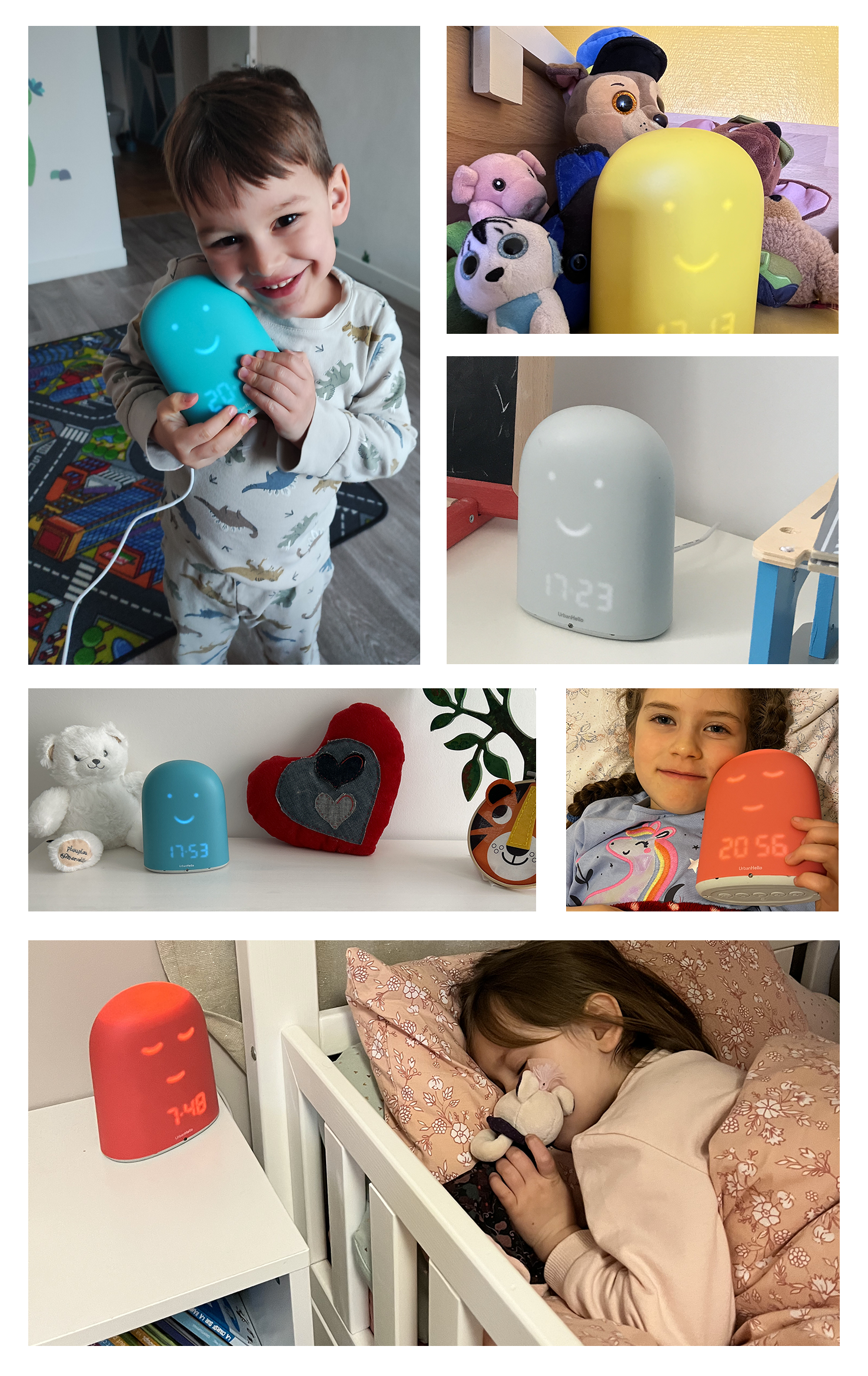Sleep problems in children: case scenarios and useful tips

Is your child struggling with sleep disorders? Are your nights turning into a never-ending battle—or even a nightmare?
Between the evening routine going off the rails, crying fits, insomnia, nightmares, and dramatic performances… navigating your child’s sleep can feel overwhelming.
You're not alone—really!
More than 1 in 3 children under the age of 7 have trouble falling asleep…
Below, we’ve outlined the most common scenarios parents face, along with helpful tips to restore peace and calm at home—so your little one can finally sleep like a dream!
Sleep Challenge #1: My child is bursting with energy at bedtime!
Your child is unstoppable.
Even after a full, active day, they’re still overflowing with energy! They want to play, run, and have fun… And when you gently tell them it’s time for bed, they look at you with wide eyes—like they were planning to party all night long!
Child sleep disorder identified: They need help winding down—or they simply have excess energy to burn after a busy day.
Here’s how you can help them settle in for a restful night:
Fill the tub, create a calming atmosphere with soft music, and invite your child to relax quietly—maybe by thinking about a happy memory.
A gentle head massage during the shampoo phase can also help them feel calm and grounded.
Take a moment for some self-reflection. Do you often struggle with insomnia? Are your evenings a rush—moving fast to get dinner ready and organize things for the next day?
👉 If so, try to slow your pace, lower background noise, and speak in a softer tone. Once again, music can be your best ally! Choose a piece of relaxing, pleasant music the whole family enjoys, and play it at roughly the same time every evening. Your child will start to associate that music with bedtime—and will likely fall asleep more easily.
If your child can read, create a cozy moment where you both enjoy your own books! After about thirty minutes of quiet reading, share your stories with each other—and then it’s off to bed!
It’s scientifically proven that 1 hour of physical activity, three times a week, can significantly improve sleep quality.
Of course, avoid any vigorous exercise in the evening, as it could have the opposite effect.
Sleep deprivation often shows up as hyperactivity, crying spells, or general fussiness. Was it an unusual week? Maybe a fun evening with friends where the kids stayed up a bit too late?
👉 If that’s the case, the only real solution is consistency! That’s the magic word when it comes to preventing child sleep disorders. Your little one should go to bed at the same time every night, as much as possible.
Sleep Challenge #2: They stubbornly refuse to go to bed!
Even though they’re clearly tired (yawning, stretching, and all…), your child flat-out refuses to go to sleep.
You suddenly turn into a master negotiator, trying to find the right bribe to get them to settle down—while secretly hoping it won’t end in more tears and tantrums.
Child sleep disorder identified: Something is likely causing your child anxiety. It’s important to identify the root cause behind their resistance and help them understand why sleep is so essential—especially at their age.
Here’s how you can help guide them toward a peaceful night’s sleep:
Did something happen during the week? A disagreement at home? A recent change in routine or environment? It could also be something at school—perhaps with a teacher or friends.
The best way to find out is simply to talk with them! Trust your parental instinct and help them put their worries into perspective.
A big bedtime cuddle can be a wonderfully comforting way to end the day. 🥰
Why go to bed when there’s still so much to do?
👉 Try not to cut them off mid-activity when it’s bedtime approaching. Instead, give regular reminders about how much time is left before lights out.
You can also use external tools like day/night clocks to help. With REMI, UrbanHello’s smart sleep trainer, you can set visual timers that help your child better understand the passage of time.
👉 Use a weekly tracker and ask them each morning how they slept, if they feel rested, and how their day is going.
Help them see that when they sleep well, they’re full of energy to enjoy a great day ahead!

Sleep Challenge #3: They wake up every night
Everything started off great. Your child is tucked in, you settle into your chair for a relaxing movie… when suddenly you hear the creak of their bedroom door. And there they are—wide awake and wandering around the house.
Child sleep disorder identified: If your child keeps waking up early in the evening, it could mean they’re not tired enough and still need something to do. On the other hand, if they’re waking later in the night, something in their room may be disturbing their sleep.
Here’s how you can help them get a better night’s rest:
You can allow them to play quietly in their room, do some drawing, or read a story.
If they’re too young to read on their own, invite them to imagine what happens next in the story you just read—or to dream up all the fun things they might do tomorrow! A lovely way to spark creativity while gently guiding them toward sleep.
Gently remind them of the importance of sleep, explain that they’ll feel tired tomorrow, and calmly guide them back to their room.
IMPORTANT: The bed should never be seen as a punishment! It should be a comforting space where they feel safe— their own little cocoon.
A bed that’s too small or an uncomfortable pillow can make it hard for your child to fall asleep easily.
Don’t hesitate to ask what’s bothering them. It’s important for your little one to feel a sense of ownership over their room—with colors and objects they truly enjoy.

Sleep Challenge #4: They’re having nightmares
Once again, everything started off smoothly—until you hear crying around 1 or 2 a.m. You get up to check, only to find your child in a panic, haunted by a nightmare that’s been recurring for two or three nights…
Child sleep disorder identified: Who hasn’t had a nightmare? As your child grows, they begin to discover not only the joys of life, but also certain fears and anxieties. Once again, the best way to help them fall asleep peacefully is to talk it through and try to understand what’s upsetting them.
To support your child through the night, check out our full article on childhood nightmares:
Sleep Challenge #5: My child is scared before bedtime!
Your little one was sleeping just fine—until suddenly, they stubbornly refuse to go to their room at bedtime. You can tell they’re tired, but just hearing the word "bedtime" is enough to make them feel anxious and stressed. They cry, whimper, and resist drifting off to sleep...
Child sleep disorder identified: Between ages 3 and 6, it’s perfectly normal for children to fear bedtime. Saying goodnight means separating from your comforting presence and being alone—right when all kinds of fears tend to surface.
Sometimes, your child may struggle to fall asleep because of a noise that frightens them. What matters most is to talk about it together! "What could have made that sound? Oh, it’s just the neighbor’s dog!"
You can even have fun recreating the noise together—add a silly face to make your little one laugh and help them relax!
Let’s be honest: being alone at night can feel pretty scary for a little one. That’s where a nightlight can really help! Combined with a calming and consistent bedtime routine, your child’s anxiety will likely fade over time.
Here again, it’s important to talk about it and reassure them!
👉 You might choose a story where the hero easily defeats the witch, the ghost, or the dragon! This can empower your child with the tools they need to overcome their fears.
When they’re worried about what’s coming the next morning, it can be hard for them to fall asleep. In these cases, it’s important to address the anxiety at its source.
Your little one is still discovering the world—and they need you by their side for support. Take time to talk with them and understand what’s going on. Was there a disagreement with a friend? Did the teacher give a warning? Are they afraid of making mistakes? These are common concerns, and there’s nothing more powerful than reassuring words to ease their mind.
Discover REMI
THE SMART ALARM CLOCK 😊
REMI and its app bring together everything you need to manage your baby’s sleep!
Its mission? Helping families sleep better — from birth up to age 10.
I bought REMI for my 4-year-old son who didn’t want to sleep alone anymore after his little sister was born. Thanks to the remote wake-up system and bedtime stories I can play from a distance, the issue is completely resolved! I 100% recommend this purchase!





 My Child Won’t Sleep Alone: How to Help Them Gain Independence
My Child Won’t Sleep Alone: How to Help Them Gain Independence
 Letting Baby Cry It Out: Effective, But At What Cost?
Letting Baby Cry It Out: Effective, But At What Cost?
 White noise for baby : a scientific research !
White noise for baby : a scientific research !
 What are the positive effects of napping on memory?
What are the positive effects of napping on memory?
 What Time Should Your Child Go to Bed? The Ideal Bedtime by Age!
What Time Should Your Child Go to Bed? The Ideal Bedtime by Age!